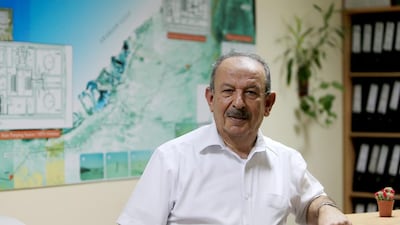ABU DHABI // Mahmoud Zaher receives a mixed response from the engineers in the oil industry he has mentored over the years.
“Most of them still contact me to catch up. They call me ‘father and professor’,” said Mr Zaher, 71, a Palestinian.
“Some others are now overconfident. They say ‘we are managers’. They don’t want to be embarrassed by their training days.”
A few of them, he said, are women who are now holding managerial positions at Abu Dhabi Company for Onshore Oil Operations, or Adco. Many others are now assisting him in the development of the Adcop project, where he works as a senior supervisor.
Adcop will be the largest and longest strategic pipeline that goes from Habshan to Fujairah, with two pumping stations and one oil terminal.
Mr Zaher spent years developing technical equipment to assist in the safety of oilfields, and in times of power cuts in Syria and Libya.
He moved to Abu Dhabi in 1980 as an electrical maintenance engineer in Abu Dhabi Company for Onshore Oil Operations (Adco) at Asab, Sahil and Shah fields, where he was involved in operations and maintenance.
But Mr Zaher’s most memorable years in the company were those spent mentoring.
He began training them on the job while in Habshan in 2005, and within four years had guided about 30 engineers and 60 technicians in engineering and operations.
He took his trainees on the field, showed them how the equipment worked, and answered their questions about the machines.
Mr Zaher said that gave his trainees the chance to “understand the fields better and not to fear the equipment”. He calls his practical training as “the art of teaching”.
With the help and support of his trainees, he was able to compile five manuals of everything he had learnt as an engineer to further expand their knowledge while training.
“I had 40 or so years of experience and I compiled them in the handbooks that are beneficial to any engineer,” Mr Zaher said.
“It is a practical guide, a reflection of my experience, for engineers and senior engineers, fresh or advanced, so they can apply what they learnt.”
The manuals deal with electrical engineering, the oil industry and pipelines in the Arabian Gulf, transmissions and power surge arresters. They include pictures, guidelines and hypotheticals for the trainees to try and solve.
Mr Zaher also taught two courses at the Petroleum Institute in electrics and transmission lines in 2009.
While he was a maintenance engineer in Adco, before mentoring, Mr Zaher's role at the company was to follow up on equipment, solve faults, attend to problems at the site and come up with techniques for to prolong the life of equipment.
After spending a few years in Adco he was given the title of “operations support”, working in “supporting the fields in the major equipment maintenance procedures in oilfields, overhead lines, generators and distribution aiding in the power system supply”.
He and his team came up with power-surge arresters using silicone rubber, instead of the conventional porcelain glass.
“We conducted in-depth research on implications of silicone rubber materials for the Gulf countries. And it was successful – cheaper, lighter, the best,” Mr Zaher said.
Silicone does not explode or burn anyone, which is why it was successful, he said.
The arresters prevented high-voltage circuits from electrocuting people and animals, and electrical outbursts caused by wind and rain.
“Power arresters discharge high voltage to the ground, providing risks and heating the ground. We call [the arrester] the martyr,” Mr Zaher said.
“One of the engineers I trained told me, ‘I will be your successor’. I told him good luck. I spent 40 years researching, let’s see how good you can get. He is now a senior manager.”
Mr Zaher is now a supervisor in Adcop, overseeing contractors and coordinators at the Fujairah and Habshan field.
aalkhoori@thenational.ae

